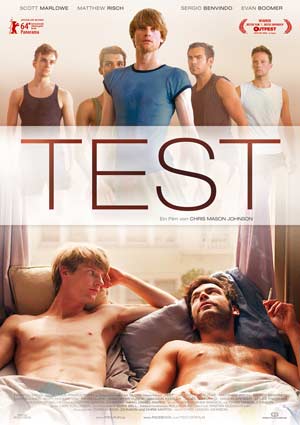
Im Juli 2014 präsentierten wir mit Tim Lienhard (ONE ZERO ONE) diesen großartigen Berlinale-Beitrag bei den Kölner Kino Nächten; im August lief er regulär:
TEST
(USA 2013, 90 min, R: Chris M. Johnson, OmU, FSK 12)
In der Bedrohung tanzt das Leben...
Fr 11/07/14, 22:00, Filmpalette Köln
So 10/08/14, 18:30, Schauburg Dortmund
Mo 11/08/14, 21:15, Bambi Düsseldorf
Mi 13/08/14, 19:00, Galerie Cinema Essen
So 17/08/14, 20:30, Lichtburg Oberhausen
Di 19/08/14, 21:00, Filmpalette Köln
Mi 20/08/14, 21:00, Casablanca Bochum
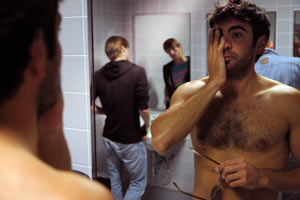
"Dieses feine, brütende Tanz-Romantik-Drama ist elektrisierend." – Cineclub
Der eher introvertierte Tänzer Frankie (Scott Marlowe) wird Mitte der 1980er in ein Ensemble für modernen Tanz aufgenommen. Er lässt sich mit seinem neuen Walkman durch die Stadt treiben und übt, sich männlicher zu bewegen. In seinem Tanztruppe lernt Frankie auch den deutlich aufgeschlosseneren Todd (Matthew Risch aus "Looking") kennen, der sich auch nicht scheut, sein Geld mit bezahltem Sex aufzubessern. Doch während sich die beiden langsam anfreunden, mehren sich die Anzeichen für diese neue schwule Krankheit...
"Ein wunderbar natürliches, unverbrauchtes Ensemble macht auch den US-Indiefilm "Test" zum Überraschungsjuwel... Ein überraschend leichter und zärtlicher Beitrag zu einem der dunkelsten Kapitel schwuler Kulturgeschichte." – Tip Berlin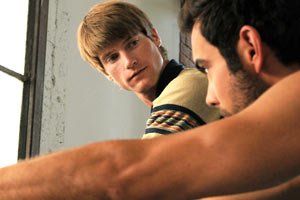
Regisseur und Drehbuchautor Chris Mason Johnson war selbst Tänzer (z.B. in Frankfurt) und erzählt in TEST von einer Freundschaft, die unter dem Schatten der frühen AIDS-Unsicherheit wächst. Trotz dieser Bedrohlichkeit ist TEST ein optimistischer, sanfter Film, der auf der Berlinale begeistert hat. Natürlich weiß der ehemalige Tänzer Johnson durch tolle Tanzsequenzen zu begeistern, zumal der Tänzer Scott Marlowe ein beeindruckendes Schauspieldebüt hinlegt.
"Faszinierende Zeitkapsel, die 1985 in San Francisco spielt, konzentriert sich auf die misstrauische Romanze zweier Tänzer... Ein lebendiges Historiendrama mit einer wirklich einnehmenden Liebesgeschichte." – The Hollywood Reporter
Auszeichnungen:
Jurypreise Bester Film & Bestes Drehbuch – Outfest, Queer Film Festival, Los Angeles 2013
nominiert für den John Cassavetes Award (Spielfilm mit weniger als 500.000$ gedreht) der Film Independent Spirit Awards
Interview zu TEST

Zur Europa-Premiere von TEST haben sich Chris Mason Johnson (links), Autor, Regisseur, Produzenten, Cutter und zusätzlicher Choreographen des Films, sowie Hauptdarsteller und Tänzer Scott Marlowe (rechts) inmitten des Berlinale-Stresses eine halbe Stunde Zeit für ein lockeres Gespräch mit Martin Wolkner genommen.
- - - - -
For the European premiere of TEST, Chris Mason Johnson (left), writer, director, producer, editor and additional choreographer of the movie, as well as lead actor and dancer Scott Marlowe (right) made half an hour time in the middle of the Berlinale stress to have a casual talk with Martin Wolkner.
Chris: I was in Frankfurt way back when. I lived there. With Frankfurt Ballet. I've been to Cologne. It's a nice town. I like Germany a lot. So, what do you want to ask us?
Martin: I have no specific direction. I read that you were a dancer in the 90s and you've won several awards. So it's kind of natural that your film is about dancing.
Chris: Yeah. My first film was not about dancing, but my second one is. That's the fact. I wanted to do a movie about dance and I was in San Francisco. So we decided to set it there, which worked out well, because San Francisco is a dance centre in the US along with New York and Chicago. So I was able to cast dancers out of San Francisco who could act.
Martin: Did you have any acting experiences before that?
Scott: No. No prior experiences before getting to work with Chris.
Martin: And you were casting dancers hoping that some of them could act or were you asking specifically for somebody who had experiences?
Chris: No, when you have this kind of dancing you can't fake it. It's like singing. If it's a pop music and you can carry a tune, you can do it. This is more like opera. You have to have certain years of training. So I just looked for dancers, and then read them from the script and saw if they had an instinct for acting.
Martin: Which you obviously had.
Scott: I guess so. (laughing)
Martin: Have you been aware that there was a parallel movie, "Five Dances", that came out two months earlier?
Chris: I guess it's parallel in a sense it will actually have a later release in the US on VOD and DVD. We're before it.
Martin: But the festivals…
Chris: Yeah, the festivals. We were at similar festivals together. I haven't seen it yet. I think it's only similar in that it's dance.
Martin: It's also gay, the story is kind of slow…
Chris: And I don't think it deals with HIV, does it?
Martin: No, it doesn't. It's just a young dancer coming to the city, wanting to dance. It's five episodes and he falls in love. There's no specific story really besides the coming of age.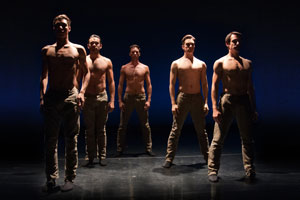
Scott: Oh, I'd like to see it. I'm curious.
Chris: You should see it.
Martin: The dancing is really well, but I thought the story was kind of slow.
Scott: I recognize the studio. I've seen a lot of the photos from…
Chris: In New York?
Scott: Yeah. It's a really pretty studio down in Soho. I've rehearsed there.
Chris: We have the same distributor actually.
Martin: But you haven't been aware of it while you were shooting.
Chris: Oh no. Maybe a little, but this is 1985, it's a period piece, it deals with history and dance is the setting for that. But that's really different than a contemporary dance story. I think there's so few dance movies that we think: Oh, this is like that, but…
Martin: There are several movies set in 1985, especially "Dallas Buyers Club", which also deals with HIV. It's a totally different angle, but have you watched that?
Chris: I haven't watched it. Have you seen it?
Scott: I have. I enjoyed it. I thought it was a really beautiful movie. I went in knowing that it was not going to end happily. Even knowing that it was still very heartbreaking.
Chris: Well, one of the things I wanted to do with this was—I haven't seen DALLAS BUYERS CLUB, but I think it's great. But one of the things I didn't want to do was make another death-bed movie, another movie where people get sick and die. And that's important stories to tell, but there's other stories also, and I wanted to tell them.
Martin: I don't know how old you are, but I guess you (Chris) were in your teens when it all happened, and it must have affected you.
Chris: Yeah, I was a teenager.
Martin: While we're (Scott and me) more of the age that we grow up with it permanently.
Scott: Yeah, there's no real memory of it not being around.
Martin: How was it for you (Chris) to bring it to the screenplay and how was it for you (Scott): Did you prepare for it or did you just go along with what you have gathered in your life?
Chris: You go first.
Scott: I actually watched some documentaries, specifically WE WERE HERE set in San Francisco. It's very strong. And spoke to family members, who were there during that time, to get an idea what it must have felt like at the very beginnings.
Martin: Straight family members?
Scott: Straight family members who had gay friends, who were sick. And just the terror around, like going out to a bar, going out eating, not knowing how this disease was being spread at first.
Martin: Did people go to restaurants and weren't sure if they could get it from the food they touched. Was it that strong?
Chris: Yeah, I can speak to that.
Scott: When I was an infant, my mother took me out to meet friends at a gay bar and my dad freaked out. He was like: What are you doing? Why are you taking a child into this environment where he might possibly get sick?
Chris: Yeah, I know that. One of the things that interested me was… Because I was there and because I was so young, I was really frightened. So I have very strong memories of those years, right? One of the things I wanted to do was to get on film something I hadn't seen. Once history becomes history, it becomes very clear. For your generation it's: this happened, then this happened, then the blood test, then ACT UP, then everybody cared for the sick people, then the community was formed… You know, it must be a bit like the 1930s where in hindsight you see everything that happened. But when you're there, it's just a fog. You don't know. This could end next week or 30 years from now, you could get it from mosquitos, from food. There's no information and you're in the middle of it. So the hindsight of history is very distorting, even as it clarifies. I wanted to capture the feeling of being there.
Martin: I think you managed quite well. The ambiguity that is there, wanting to live and going out, still dating people and having sex, while…
Chris: Wanting to have sex, yeah, because you're 18 or 20. Sort of what you should be doing.
Martin: You still have those urges. You feel alive, and yet you're afraid to die of it. Wow.
(emotional pause)
Martin: How did you go along shooting this, preparing for this '85 setting. I guess you didn't have a lot of budget.
Chris: Right. Well, this was another thing that was really important to me: Just like the history of AIDS or the history of a war can become very history book, very simplified. I think when you do period, it can become kitschy and a cliché. You see it a lot on TV. Like let's go to the thrift store and buy every 1960s costume, or 1970s… And in fact in life we might wear something that's new and something that's ten years old. You might listen to a song from eight years ago. Not every song and not every bit of clothing is from that year. It was important for me to get a realistic image of that period that wasn't kitschy. To do that is not really expensive, you just have to know what you're looking for. That was the aesthetic part. But the pragmatic part, yes, we didn't have a lot of money. I couldn't row streets with cars, so I pointed the camera up a lot (laughs) and picked locations very carefully.
Scott: So interesting that you say not everything that's happening in this year is only from this year. When you were asking us in this party scene to disco dance together, we were all looking at him like: But it's 1985!
Chris: Well, the people in 1985 who were like 20-something, that would have their dance in 1978 when "Saturday Night Fever" came out. Just like your mum might still break into the jitterbug.
Scott& Chris: She's not that old. (both laugh)
Chris: Right, so you're doing it. Five years later… What was five years ago? 2009. Are you gonna do nothing that you did in 2009?
Scott: Most of the music I listen to is from that time. That's interesting.
Chris: It is. It's one of the ways that I think movies tend to distort period.
Martin: I think you have a nice view on that.
Chris: Thank you. Yeah, and also the phone with the chord. I mean by then there were push-button phones, but somebody still might have.
Martin: I've already seen Hollywood actors sitting in front of the dial and just pushing into the holes without really dialing. And it was a huge film, but I can't remember which one.
Chris: No! Seriously?
Martin: It's true. It's like a piano scene when you can see that he's not actually playing, or someone not seriously typing on the computer.
Chris: That's bad directing. It's all about the details, and if you care about the details, then the whole thing will come together.
Martin: One of your major details is the Walkman. I don't know when it came out. I think early 80s.
Chris: Yeah, like 1981, '82.
Martin: What was it like for you to have not the ghettoblaster anymore, but something more personal that is very common for us nowadays, like MP3 players.
Chris: I think it was just like it is now, even now that we're so used to it, there's still that feeling when you go outside and you have really good music on, like: This is my movie now. Everything changes. It's a pretty strong feeling. When did you start listening to a headset?
Scott: Gosh, I don't know. Probably around '88, when I was old enough to put the headset on in the car on a road trip and not to have to listen to mom and dad's music, instead listen to your own.
Chris: Right, right, there you go. This really was a moment. We all remember the first cell phone: I'm on the street talking! (all laugh) Now it's like: Gimme a break! But I think it was the same: There's music in my ears! And now it's a movie.
Martin: Especially for a dancer this must be quite a thing to be on the train and break out into dancing.
Scott: And to be able to warm up to your own personal soundtrack. That is really special.
Chris: Oh yeah!
Scott: I'm used to that. That's what we do, we go into the rehearsal studio before performances and everyone has their own world, preparing themselves to go on stage. The idea of suddenly being able to do that was probably very exciting.
Chris: I guess so. As with all technology there's always the thought of: Is this good, is this bad? Will we lose memories when we have Google? But you will also notice in the movie that he listens to Tchaikovsky, Lauri Anderson, to a Brian Eno kind of sound. As the dancer character, who has music in his life, who knows music in a deeper way than the average person, there's more of a range of selections. I guess your character is about 23. I don't think the average 23-year-old will be listening to Tchaikovsky.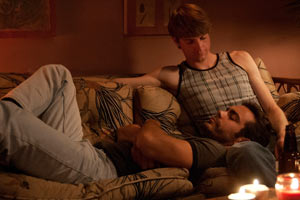
Martin: I don't know about dancers, but I guess if you dance you have a lot of different music depending on which company you are in…
Scott: Oftentimes you acquire the music that you are going to be performing to and just live in it for a period, so that you can really, really embody the sound.
Martin: How was the choreography for the movie? Did you personally like it? Was it something that you consider modern or was it really 80s?
Scott: I can't speak to whether or not it was 80s, but Sidra Bell from New York was the choreographer and she's very now, she's incredibly contemporary. I had a lot of fun working with her one on one in the studio, developing gestures and getting into the detail of what the choreography was going to be. We really collaborated together, then Chris came in and collaborated with her as well to give it more of a 80s contemporary feel.
Chris: I think… How do you say anachronism in German? Anachronismé? No, that's French.
Martin: Anachronismus.
Chris: Anachronismus, Anachronismus. Yeah, I didn't want any Anachronismuses…
Martin: Anachronismen.
Chris: I didn't want any Anachronismen that were too big. So I made sure that there was nothing that was like: There is absolutely no way that that happened in 1985. But at the same time I didn't want to be totally historically accurate to where movement was at that point, because it would be too boring. Because a lot of what had happened since it started in Frankfurt with Billy Forsythe has now gone über alles and everyone is doing this extreme stuff. So to not have that in the movement would have just been too static. I tried to tread the line between stuff I like, but not too many Anachronismen. Verstehst du?
Martin: Yeah, I understand. I'm not too used to dancing.
Chris: You're not a dancer.
Martin: I'm not very familiar with the subject.
Chris: Most people aren't.
Martin: But then in the audiences of festivals there are people who are specifically interested in that, they only come for this film because there is finally a dancing film.
Chris: So that's good for us, we have two audiences. But that was what I was going to say: The answer I just gave is what I always tell them, because sometimes it's: "I don't think you would have done that in 1985!" (everyone laughs) Okay, it's a movie. It's poetic licence.
Martin: How is it with the unmanly movements that your character is doing? (Chris laughs) Of course everyone has his own style. Is that something real?
Chris: In the Kultur? In the world?
Scott: Yeah, I mean it's not in my world.
Chris: You should talk about the modern ballet distinction a little bit. Your world isn't the world of the movie.
Scott: No, the dance world that I'm personally in is not a sort of ballet world where men are men and women are women and we dance together. There's not a lot of gender specification in the kind of dance that I do.
Chris: They're just bodies.
Scott: It's much more abstract. There's not a whole lot of narrative, no story telling. It's more about emotions.
Chris: Or movement.
Scott: I dance emotions. There's a lot of work out that's just movements for movements' sake. And it's beautiful, but it's hard to connect to, because it's far too abstract.
Chris: And the world of the movie is of contemporary ballet, which is like Frankfurt Ballett or Twyla Tharp or Jerome Robbins or Sidra Bell. The world of contemporary ballet takes some vocabulary from ballet, but… and takes gender… They're people dancing, not just shapes. Once you have people, you have gender. And once you have gender, you have these issues of masculine and feminine, and that can cut both ways. Like in Sidra Bell's contemporary work, she plays with gender, she has very Weimarer, you know, very long eyelashes on the men…
Scott: And that's so much fun.
Chris: And that's fun. That's one angle on it, but then in a classical ballet company you might have the guys who have to act butch, because they're…
Scott: Interesting. I feel like in a ballet company there's a lot more acting that has to happen, because they're characters that you put on. There's a lot of acting in Sidra's work as well.
Chris: Tanztheater, nicht Ballett. Pina Bausch, for example, uses gender, because they are people. Anyway, it's hard to…
Scott: It's hard to what?
Chris: It's hard to make categories. It's a little bit like film, it's art film vs. Hollywood, but there's also hybrid.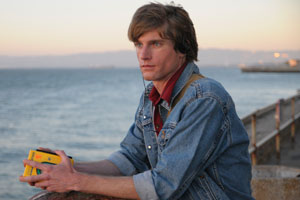
Martin: Grey zones. Have you (Scott) ever been accused of not being manly enough?
Chris: I accused you yesterday of that. (laughs)
Scott: What?
Chris: You big poofter, what are you doing here on Potsdamer Platz? Put some clothes on. No, I'm kidding.
Scott: You're kidding. (laughs) No, it's never come up, 'cause the masculine energy isn't valued in the same way in the work that I do or the world that I live in.
Chris: I have been accused. I have been shouted at by a choreographer: "Dance like a fucking man!" Clearly it left enough of an impression that it's in a movie.
Martin: And what did you do?
Chris: I went: "What?!" No, like all real life I was hurt, but I wasn't very interested. I didn't say anything.
Martin: But did you…?
Chris: Change my dancing. You know, I was getting a little wristy, right? I went like that… (Scott chuckles) But it's like a not, the thing about ballet is there's a lot of undulating arm and that is very close to the classic gay wrist. You just have to watch that in ballet. And that's not in modern dance.
Scott: No, it isn't.
Chris: The don't do these port de bras.
Scott: It's tempting, though.
Chris: It's tempting, so tempting, right. That's why we overdo it, because it's fun.
Scott: It's fun.
Chris: It's like putting on drag or something.
Martin: Dancing is a lot about tension, isn't it? Tension and attention.
Chris: Definitely. It's athletic.
Martin: I don't have any more questions.
Chris: You got a lot.
Martin: Do you have anything that you'd like to share?
Chris: Well, I would say, as someone who lived in Germany and I've always loved this country, I'm very happy that we have a German distributor. So it's going to be out there at Pro-Fun. And I think, you could maybe find out the dates, before you publish your piece, when it's being released in Germany.
Martin: Yes, of course. And we will try and talk to them…
Chris: To coordinate?
Martin: Yeah, because I guess a lot of us festival programmers would like to have it in October, so we will probably chat with them.
Chris: I hope they'll show it in Frankfurt, so that all my old friends can see it. A lot of them still live there, the dancers.
Martin: There's no festival anymore.
Chris: But maybe a theatre for Pro-Fun, a Kino.
Martin: Probably, when they have a real release date after the festival release.
Chris: Any last days on your German experiences?
Scott: This is my first time to Berlin and I love it. I really love it!
Chris: It's so cheap here, too, compared to Paris, New York and San Francisco.
Martin: It's one of the cheapest capitals. But prices are rising here, because whoever has money buys real estate.
Chris: Oh, they're speculating here.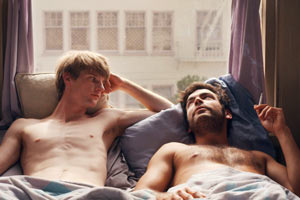
Martin: No, not only speculation, but also it's kind of fashionable to have a flat around here.
Chris: A Wohnung in Berlin.
Martin: And everyone's coming here to party. It's the sexy party capital of the world.
Scott: I hope it doesn't drive the artists out.
Chris: But there's so much space.
Martin: It's sort of happening.
Chris: Is it?
Scott: It's happening in San Francisco.
Chris: But San Francisco is 7 square mile. Berlin is like L.A., it spreads.
Martin: But who wants to live in the outskirts?
Chris: Yeah, it's true. But that is the life of cities. It happens everywhere. It goes in waves.
Martin: They go to other parts of the town.
Chris: So, Potsdamer Platz was completely levelled, right? Now we're just talking tourism, but yeah.
Martin: It was, and actually you can still have labels on the pavement where Berlin wall was. If you go to the crossing over there.
Chris: I've seen postcards of a very busy Platz with trams and old buildings and that was probably Potsdamer back in the Billy Wilder…
Martin: Or maybe that was Alexanderplatz.
Chris: Alexanderplatz mit dem Turm. Okay, anyway. You should see my first movie. It's online.
Scott: I told you that I saw it before we even met. That was pretty cool, because it let me know that he was for real.
Chris: I'm for real, dude.
Martin: What do you mean?
Chris: That I'm not a crappy filmmaker.
Scott: I was introduced to Chris and he mentioned that this was the last film that he had done. I had just seen it on TV a few months prior. That actually let me know that he made…
Chris: …a real movie.
Scott: …a good movie.
Chris: It wasn't a porno. Next one. (laughs)
Martin: A dancing porno.
Chris: Well, I mean "Boogie Nights" has already been made. I love that movie. Anachronismen, plural. Anachronismüs.
Martin: -mus.
Chris: Okay, singular. Thank you.
Martin: Thank you very much for coming out here and having this wonderful film.